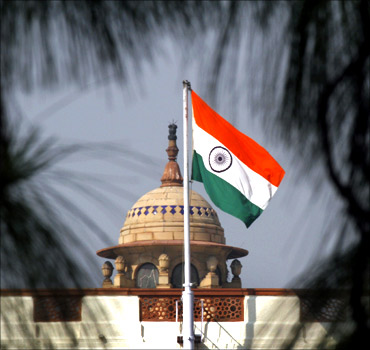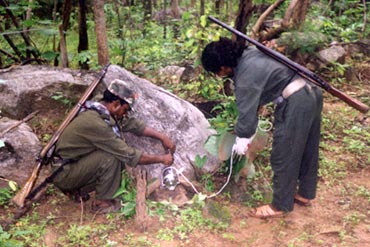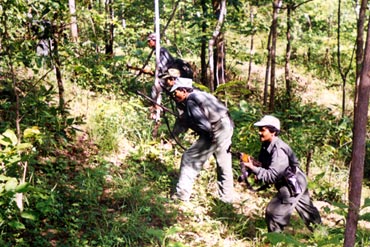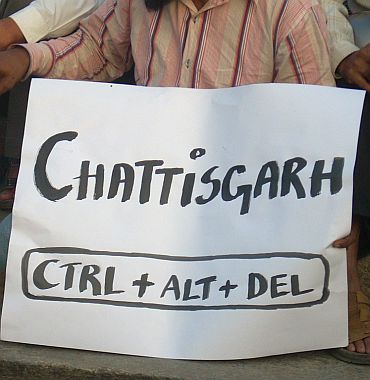 | « Back to article | Print this article |
'We must bear the discipline and rigour of Constitutionalism'
An excerpt from the order of the Supreme Court in the writ petition (civil) no 250 of 2007, Nandini Sundar and others versus State of Chattisgarh, in the court of Justice B Sudarshan Reddy
We, the people as a nation, constituted ourselves as a sovereign, democratic republic to conduct our affairs within the four corners of the Constitution, its goals and values.
Consequently, we must also bear the discipline and the rigour of Constitutionalism, the essence of which is accountability of power, whereby the power of the people vested in any organ of the state and its agents can only be used for the promotion of Constitutional values and vision.
This case represents a yawning gap between the promise of a principled exercise of power in a Constitutional democracy and the reality of the situation in Chattisgarh, where the respondent, the state of Chattisgarh, claims it has a Constitutional sanction to perpetrate indefinitely a regime of gross violation of human rights in a manner, and by adopting the same modes, as done by Maoist/Naxalite extremists.
We were reminded of 'Heart of Darkness'
Chattisgarh also claims it has the powers to arm, with guns, thousands of mostly illiterate or barely literate young men of the tribal tracts who are appointed as temporary police officers, with little or no training, and even lesser clarity about the chain of command to control the activities of such a force, to fight the battles against alleged Maoist extremists.
As we heard the instant matters before us, we could not but help be reminded of the novella, Heart of Darkness by Joseph Conrad, who perceived darkness at three levels: (i) The darkness of the forest, representing a struggle for life and the sublime; (ii) The darkness of colonial expansion for resources; (iii) The darkness, represented by inhumanity and evil, to which individual human beings are capable of descending, when supreme and unaccounted force is vested, rationalised by a warped world view that parades itself as pragmatic and inevitable, in each individual level of command.
'The horror! The horror!'
Set against the backdrop of the resource-rich darkness of the African tropical forests, the brutal ivory trade sought to be expanded by the imperialist-capitalist expansionary policy of European powers, Conrad describes grisly and the macabre states of mind and justifications advanced by men, who secure and wield force without reason sans humanity, and any sense of balance.
The main perpetrator in the novella, Kurtz, breathes his last with the words: "The horror! The horror!" Conrad characterised the actual circumstances in Congo between 1890 and 1910, based on his personal experiences there, as "the vilest scramble for loot that ever disfigured the history of human conscience."
'Seriously undermines Constitutional values'
As we heard more and more about the situation in Chattisgarh and the justifications being sought to be pressed upon us by the respondents, it began to become clear that the respondents were envisioning modes of state action that would seriously undermine Constitutional values.
Given humanity's collective experience with unchecked power, which becomes its own principle and its practice its own raison d'etre, resulting in the eventual dehumanisation of all the people, the scouring of the earth by the unquenchable thirst for natural resources by imperialist powers, and the horrors of two World Wars, modern Constitutionalism posits that no wielder of power should be allowed to claim the right to perpetrate the state's violence against any one, much less its own citizens, unchecked by law, and notions of innate human dignity of every individual.
'People do not take up arms without reason'
Through the course of these proceedings, as a hazy picture of events and circumstances in some districts of Chattisgarh emerged, we could not but arrive at the conclusion that the respondents were seeking to put us on a course of Constitutional actions, whereby we would also have to exclaim at the end of it all: "The horror, the horror."
People do not take up arms, in an organised fashion, against the might of the state, or against fellow human beings without rhyme or reason. Guided by an instinct for survival, and according to Thomas Hobbes, a fear of lawlessness that is encoded in our collective conscience, we seek an order.
However, when that order comes with the price of dehumanisation, manifesting injustices of all forms perpetrated against the weak, the poor and the deprived, people revolt.




